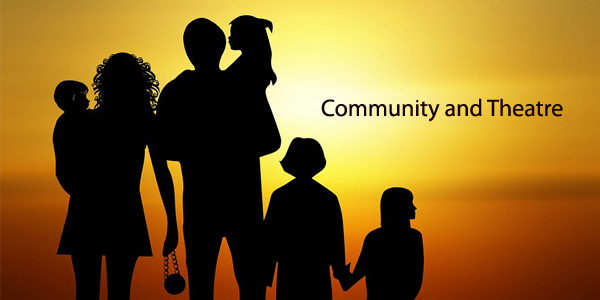
Bill English, Artistic Director
I was recently at a preview of our current Sandbox Show, “All of What You Love and None of What You Hate.” As the patrons were leaving, I asked a couple about what they thought of the show. They both sighed and admitted that the play had struck a little close to home. Their son, like the characters in AOWYL, had been involved in an unexpected pregnancy that had changed and challenged their lives. The play had left them a little shaken. I felt a strong sense of empathy for them. They waited outside to speak more with me but I used the excuse that I had to get back to a production meeting and was a bit ashamed that I didn’t take more time. I was too busy to really take the time to hear them.
Several years ago, as the audience was leaving our production of Annie Baker’s “The Aliens,” more than a few would comment that they hated the play. They couldn’t identify with the characters. Several days after, I would hear back from more than a dozen that they realized it reminded them of their troubled son, or the suicide of a friend. How many more had similar experiences to share? In our first season, our production of Rebecca Gilman’s “The Glory of Living” elicited my favorite response. “You changed my view on capital punishment.” Theatre leaders live for comments like this, comments that make us feel we have an impact and yet we do little to really check in with our community.
When we hear the phrase “community theatre,” we tend to think of amateur theatre, without Equity actors and professional designers. Volunteers build the sets and manage the box office. We tend to think of this kind of amateur theatre as lesser than, yet the “community theatre” has something that we often lack in our biggest professional theatres. The word amateur comes from 18th Century French, and Latin before that, which originally meant, “love,” or “lover” or “for the love of it.” Amateur theatres may lack professionalism, but they are embedded in the community. Many people help put up the productions and feel connected to the process. They come to the theatre with their families after having pounded nails or painted sets, hemming costumes or designing posters.
We have volunteers at our professional theatres, and they make a tremendous difference. Yet, I often feel that our regional theatres live in ivory towers, aloof from the communities we serve. Our leadership is seldom present in the theatre when patrons arrive. Try as we might, we seldom succeed in creating a forum for members of the audience to socialize and discuss themes in plays. We pay a lot of lip service to creating community around the theatre, but how many of us are really willing to dig in and get to know our subscribers, what their lives are like, what drew them to us, what they are thinking and feeling.
I talk a lot about our empathy gym where we come to practice our powers of compassion, but we send our patrons off into the night to work out solo. In fact, as we sit in the dark, even members of a bigger party, our experience of the drama is largely a solo one. When the laughter grows so that we feel it rock the theatre, or when a tragic moment silences us and we can feel the dense quiet in the room, we are mostly alone. Is this just the nature of theatre? We gather together, but experience alone. Do we feel closer? Do we feel any kinship with our brothers and sisters next to us? I think generally not. Is there a way to generate and amplify a collective understanding? Is there a way to encourage strangers to connect and become to each other, less strange, or is that not our purpose?
Theatre began as the spiritual center of the Greek culture. The plays were born out of a greater festival that celebrated Dionysus, the god of abandon. They unified the community with stories that validated their collective unconscious, the myths that expressed the deepest urges and yearnings of the people. What can we do to make the experience of those who come to us more meaningful? Is there a way to build a spirit of community before the play begins? And after? As a boy, I used to love the moments in religious services, where the celebrant would suggest that we turn to the person next to us and say, “Hi,” and tell them our name and where we’re from. And the moment when the celebrant asked us to take a moment to be silent together. Should we try that? And after, can we try harder to encourage patrons to stay and talk about the play? Or just hang out in the lobby and visit and share impressions? Donuts and coffee? Introduce themselves? How can we keep the “amateur” alive in us? Theatre is our job, yet we need to work harder to stay in touch with “the love of it” that unites us.
Best,

Bill




I’ve loved some of your productions in the past. A great intimate theater. Looked forward to seeing City of Angels. Had a fine front row seat. But the entire production was so over amped that had to bail out at intermission because my ears were bleeding. Tone it down!
Len
Oh, dear. I would not like to do the superficial thing of saying hello to my seat neighbor. Or doing meet and greet. Sort of like cocktail parties where you don’t know anyone and I have no patience for that.
Sometimes, a spontaneous hello or brief comment and smile are nice, but mandatory?